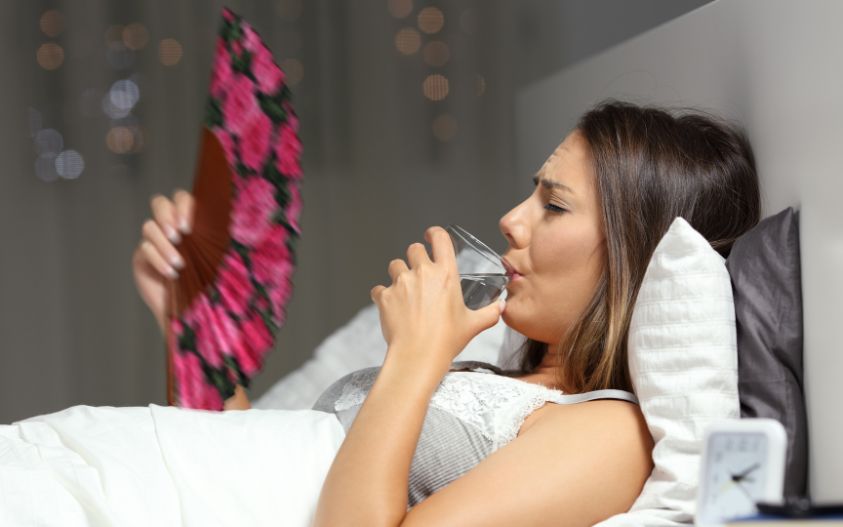What is the connection between night sweats and alcohol withdrawal? Most people experience night sweats on occasion. Maybe you’ve woken up in a damp bed after a nightmare. Or perhaps you had a high fever when sick from a virus.
The majority of the time, these night sweats are not too severe. Occasionally, you sweat so much that your bed needs some time to dry. These severe night sweats are common when people are withdrawing from alcohol.
Why does this happen? To understand why people in alcohol withdrawal have night sweats, it is necessary to understand what happens to the body when a person addicted to alcohol goes cold turkey.

The Body’s Reaction to Alcohol Withdrawal
There are a number of physical reactions to alcohol withdrawal which are connected to night sweats:
The Brain on Alcohol
Alcohol affects GABA and glutamate, two neurotransmitters in the brain. GABA works to help calm the brain. Contrarily, glutamate ‘excites’ the brain. Alcohol increases GABA’s calming effects and suppresses glutamate activity, which together result in a sedative effect.
When alcohol is used consistently over a prolonged period of time, the brain starts producing less GABA and more glutamate to try to maintain balance. When the person stops drinking alcohol, the brain is suddenly getting too much glutamate and too little GABA, creating a state of hyperexcitability. This causes hyperactivity in the body, leading to severe night sweats.
Autonomic Nervous System and Withdrawal
This impacts the autonomic nervous system (ANS), too. The ANS regulates temperature control, among many other physical functions. When the sedative effects of alcohol are gone, the ANS becomes overactive. This heightened state, often referred to as “sympathetic overdrive,” results in increased heart rate, blood pressure, and temperature. As the ANS attempts to regulate temperature, it causes severe sweating.
Hormonal Changes
Alcohol withdrawal disrupts hormonal balance as well by interfering with the hypothalamus, a part of the brain responsible for regulating body temperature. During withdrawal, the hypothalamus struggles to maintain stable body temperature, leading to episodes of excessive sweating. At night, when the body is at rest, this dysregulation can become more pronounced, resulting in intense sweating episodes while asleep.
The Detox Process and Its Impact on the Body
When your body detoxes from alcohol, it needs to expel toxins and adjust to the absence of the substance. Night sweats are part of the body’s attempt to flush out toxins. Detox can also lead to other withdrawal symptoms such as tremors, fever, and anxiety, which only exacerbate night sweats.
Stages of Alcohol Withdrawal and Night Sweats
Over the different stages of alcohol withdrawal, the night sweats vary in severity.
- Early Stage (6-24 Hours): Moderate night sweats begin as the body starts to adjust to the absence of alcohol.
- Acute Stage (24-72 Hours): Withdrawal symptoms peak and night sweats become more intense due to the autonomic nervous system’s overactivity. In severe cases, symptoms like seizures or delirium tremens can occur, accompanied by profuse sweating.
- Post-Acute Withdrawal Syndrome (PAWS): PAWS can last for weeks or even months. During this time, night sweats may persist but they are milder than in the previous stages.
Impact of Night Sweats on Sleep and Recovery
Night sweats might not seem like a particularly troubling symptom of alcohol withdrawal, but they can have a material impact on recovery.
When sweating at night, the person might awaken frequently in discomfort. They may find it difficult to fall back asleep and maintain uninterrupted sleep. Lack of sleep can contribute to fatigue and irritability which can make withdrawal symptoms feel more intense.
Sleep deprivation also weakens the body’s ability to cope with stress and makes it harder for the person to maintain emotional stability during withdrawal. Studies have shown that poor sleep during alcohol recovery increases the risk of relapse, as individuals may turn back to alcohol to self-medicate their insomnia and anxiety.
Managing Night Sweats During Alcohol Withdrawal
There are ways to manage night sweats during alcohol withdrawal and minimize their impact on sleep and recovery. It is important to mention that managing night sweats is just one of the reasons to withdraw from alcohol under medical supervision. Not only can they help you get more comfortable by providing guidance, but they can also save your life if other symptoms become severe.
Here are some strategies to manage night sweats:
- Hydration and Electrolytes: Night sweats can lead to dehydration and loss of essential electrolytes, which can worsen other withdrawal symptoms. Drinking plenty of fluids and replenishing electrolytes with sports drinks or supplements can help counteract the effects of excessive sweating.
- Cooling Techniques: Sleep in a well-ventilated room, using lightweight, breathable bedding, and wearing moisture-wicking clothing. Take a cool shower before bed if possible, as it can lower body temperature.
- Sleep Hygiene Practices: This refers to practices that increase your chances of quality sleep. They include establishing a regular sleep routine, avoiding caffeine or heavy meals before bed, and creating a relaxing bedtime environment. The reduced stress may decrease the severity of night sweats, and you are more likely to sleep well even when sweating.
- Medications: In some cases, medications like clonidine or gabapentin may be prescribed to help regulate the autonomic nervous system and reduce sweating. However, these medications should only be taken under medical guidance.
- Psychological Support: Among many other reasons to take advantage of therapy, counseling, or support groups, they can mitigate the stress and anxiety that exacerbate night sweats.
Conclusion
Withdrawal from alcohol is not easy and should be done under medical supervision. There are many severe symptoms that may occur. While night sweats may not seem so significant, they can have an impact on your sleep quality and comfort, which can make it harder to see the process through.
Choose a rehab that offers medical detoxification from alcohol, both to improve your comfort and to ensure that you are safe.




